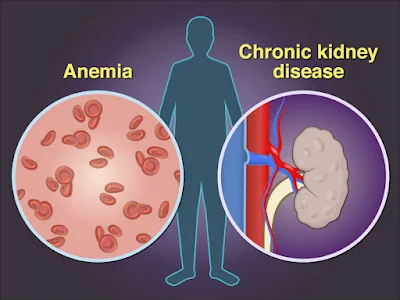Chronic kidney disease (CKD) affects millions of people worldwide and often leads to anemia, a condition characterized by a deficiency of red blood cells. Managing chronic kidney disease-related anemia is crucial for improving quality of life and preventing further complications. In this comprehensive guide, we will explore the causes, symptoms, diagnosis, treatment options, lifestyle modifications, and tips for living well with chronic kidney disease-related anemia.
Understanding Chronic Kidney Disease-related Anemia:
Chronic kidney disease-related anemia occurs due to two primary factors: decreased production of erythropoietin (a hormone that stimulates red blood cell production) and impaired iron metabolism. The kidneys play a vital role in the production of erythropoietin, so when they become damaged or diseased, the body experiences a decrease in red blood cell production, leading to anemia.
Symptoms of Chronic Kidney Disease-related Anemia:
Recognizing the symptoms of chronic kidney disease-related anemia is essential for early detection and intervention. Common symptoms include persistent fatigue, weakness, shortness of breath, pale skin, dizziness, difficulty concentrating, and an increased heart rate. If you experience any of these symptoms, consult your healthcare provider for a comprehensive evaluation.
Diagnosis of Chronic Kidney Disease-related Anemia:
Accurate diagnosis plays a critical role in effectively managing chronic kidney disease-related anemia.
Healthcare providers use various diagnostic tests, including:
1. Complete Blood Count (CBC): This blood test measures the number of red blood cells and hemoglobin levels.
2. Serum Ferritin Levels: Testing iron storage levels in the body helps determine if iron deficiency is contributing to anemia.
3. Transferrin Saturation: Measures the ability of iron to bind to transferrin, a protein responsible for transporting iron in the blood.
4. Bone Marrow Biopsy: Sometimes, a bone marrow biopsy may be performed to determine the underlying cause of anemia, though it is rarely necessary.
Treatment Options for Chronic Kidney Disease-related Anemia:
Several treatment options are available to manage chronic kidney disease-related anemia effectively:
1. Erythropoiesis-Stimulating Agents (ESAs): ESAs are synthetic versions of erythropoietin that help stimulate red blood cell production. They are administered through injections under the guidance of a healthcare professional.
2. Intravenous Iron Therapy: In cases where oral iron supplements are ineffective or poorly tolerated, intravenous iron therapy may be recommended to increase iron levels in the body.
3. Blood Transfusions: Reserved for severe cases or situations of acute blood loss when other treatment options have proven inadequate.
Lifestyle Modifications for Managing Chronic Kidney Disease-related Anemia:
In addition to medical treatments, adopting certain lifestyle modifications can significantly improve the management of chronic kidney disease-related anemia:
1. Dietary Changes: Consuming iron-rich foods such as lean meats, poultry, fish, legumes, and incorporating vitamin C-rich fruits and vegetables can enhance iron absorption.
2. Adequate Fluid Intake: Consult with a nephrologist to determine the appropriate fluid intake, as excessive consumption may strain the kidneys.
3. Regular Exercise: Engaging in regular physical activity, such as walking or low-impact exercises, can help improve cardiovascular health and combat fatigue. Always consult with healthcare providers before starting any exercise program.
Tips for Living Well with Chronic Kidney Disease-related Anemia:
Living with chronic kidney disease-related anemia requires proactive self-care and support. Consider the following tips to enhance your overall well-being:
1. Regular Monitoring: Consistently follow up with your healthcare provider for routine blood tests to monitor hemoglobin levels and iron stores.
2. Medication Adherence: Take prescribed medications as instructed and promptly report any adverse effects or concerns to your healthcare professional.
3. Emotional Support: Seek support from loved ones or join support groups to connect with others facing similar challenges. Additionally, engage in stress management techniques, such as meditation or counseling, to cope with emotions related to living with chronic kidney disease-related anemia.
Conclusion:
Managing chronic kidney disease-related anemia involves a multi-faceted approach, including medical treatments, lifestyle modifications, and regular monitoring.
Early diagnosis, personalized treatment plans, and proactive self-care can vastly improve quality of life for individuals living with this condition. Remember to consult with healthcare professionals for accurate diagnoses and tailored management strategies. With proper care and support, it is possible to effectively manage chronic kidney disease-related anemia and lead a fulfilling life.
Sources:
1. National Kidney Foundation (https://www.kidney.org/)
2. Mayo Clinic (https://www.mayoclinic.org/)
3. American Kidney Fund (https://www.kidneyfund.org/)


0 Comments
Post a Comment
Share your views